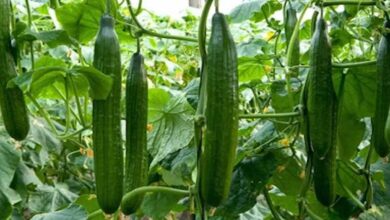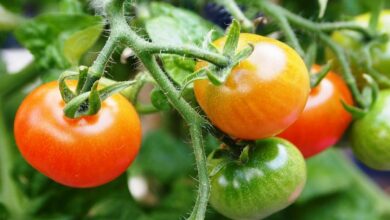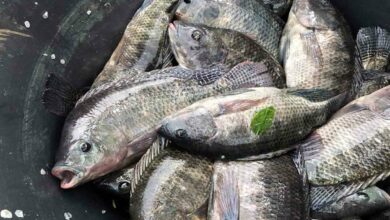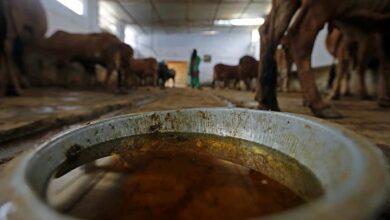Success Story: This farmer from Goa did this amazing thing by cultivating vanilla in just 1 acre
Success Story: Living in the hamlet of Netravali in Sanguem, Goa, Chinmay Tanshikar has dedicated over thirty years to turning his family’s property into a flourishing organic farm. Chinmay has a B.Com. degree, but agriculture has always been his real love. As part of his father’s agricultural history, Chinmay started out by tending to coconut and arecanut farms. However, his creative mind quickly inspired him to add high-quality spices like cinnamon, black pepper, and vanilla to the farm’s offerings.
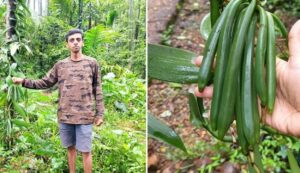
Vanilla is an expensive crop
When vanilla prices shot up to an incredible Rs 50,000 per kilogram, Chinmay’s plantation acquired the second-most valuable spice in the world, behind saffron. “It was a period when the popularity of vanilla was at its height,” Chinmay says. “That’s when I decided to start growing it.”
But the vanilla market is known for its extreme volatility. Following the first boom, prices fell precipitously, compelling many farmers to give up on the crop. Still, Chinmay did not give up. He is among the few farmers in Goa who still grows vanilla now, and it is now his farm’s main source of income.
Chinmay made almost Rs 15 lakh per acre selling vanilla for Rs 30,000 per kilogram in the 2020–21 season. He sold vanilla for Rs 12,000 per kilogram in years when prices were lower, but the profits are still remarkable.
Methods of Organic Farming
Chinmay is dedicated to organic farming and uses sustainable methods to keep his land and crops healthy. “I use organic techniques entirely,” he says. “Dried leaves and other farm waste serve as manure, and pests are managed through integrated farming.”
Chinmay uses biocontrol agents like Trichoderma and Pseudomonas to control illness. These organic remedies safeguard the crops while also encouraging robust development. These organic techniques are especially crucial for controlling fungal diseases in crops like vanilla in an area like Goa that receives a lot of rainfall.
Increasing diversity is necessary for strength
Chinmay thinks that diversity is a key component of long-term agricultural success, and his farm exemplifies this approach. He has one acre of vanilla planted out of his twenty-five acres. In addition to vanilla, he commercially produces coconut, areca nut, black pepper, cinnamon, nutmeg, and cloves. This varied crop mix distributes the risk and guarantees a consistent revenue stream all year long.
Other farmers should not depend only on a particular crop, Chinmay counsels. “Other crops may make up for the loss if one fails. Integrated farming has both financial and environmental benefits.”
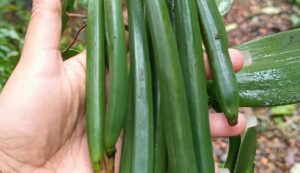
Additionally, Chinmay sells agriculture byproducts like nutmeg, pineapple, etc. He spoke about how ICAR developed a method for manufacturing candies out of nutmeg peels, which Chinmay now uses in his agricultural operations. He said that he makes around Rs. 12 lakh from these byproducts annually.
In addition to this, Chinmay keeps bees and instructs other farmers in the art of doing the same. When all of his endeavors are combined, Chinmay’s annual income might reach 50–60 lakh.
An additional source of income
Apart from farming, Chinmay has dabbled with agro-eco-tourism, providing guests with an opportunity to see farm life directly. Many of the international visitors to his farm stay are interested in learning about organic farming and the production of spices.
“About 90 percent of our vanilla crop and most of the byproducts (Nutmeg candies) is sold directly to visitors at our farm,” explains Chinmay. “We also have bulk buyers like restaurants and superstores who purchase vanilla in larger quantities.”
By cutting out middlemen, Chinmay’s direct-to-consumer strategy not only increases the value of his items but also enables him to keep bigger profit margins.
Honours and Achievements
We have taken note of Chinmay’s commitment to innovation and organic farming. In appreciation of his services to sustainable agriculture, Prime Minister Narendra Modi gave him the Best Organic Farm – Krishi Ratna award in 2016. The Goa government has also awarded him the Krishi Bhushan and Best Horticulturist awards.
In 2018, the Indian Council of Agricultural Research (ICAR) presented Chinmay with the Innovative Farmers Award. Beyond winning accolades, he collaborates with ICAR in other ways as well. He often takes part in training programs as a student and mentor, imparting his expertise to other farmers.
Sustainable Agriculture
The inspiring tale of Chinmay Tanshikar shows how creativity and sustainability can revolutionize conventional agricultural methods. Through adoption of organic practices, crop diversification, and capitalizing on the profitable vanilla industry, he has established a prosperous agricultural enterprise that serves the interests of his family as well as the larger community.
With the increasing demand for premium organic goods worldwide, farmers such as Chinmay Tanshikar are setting the standard and demonstrating that sustainable agriculture is not only a possibility but the way of the future.


